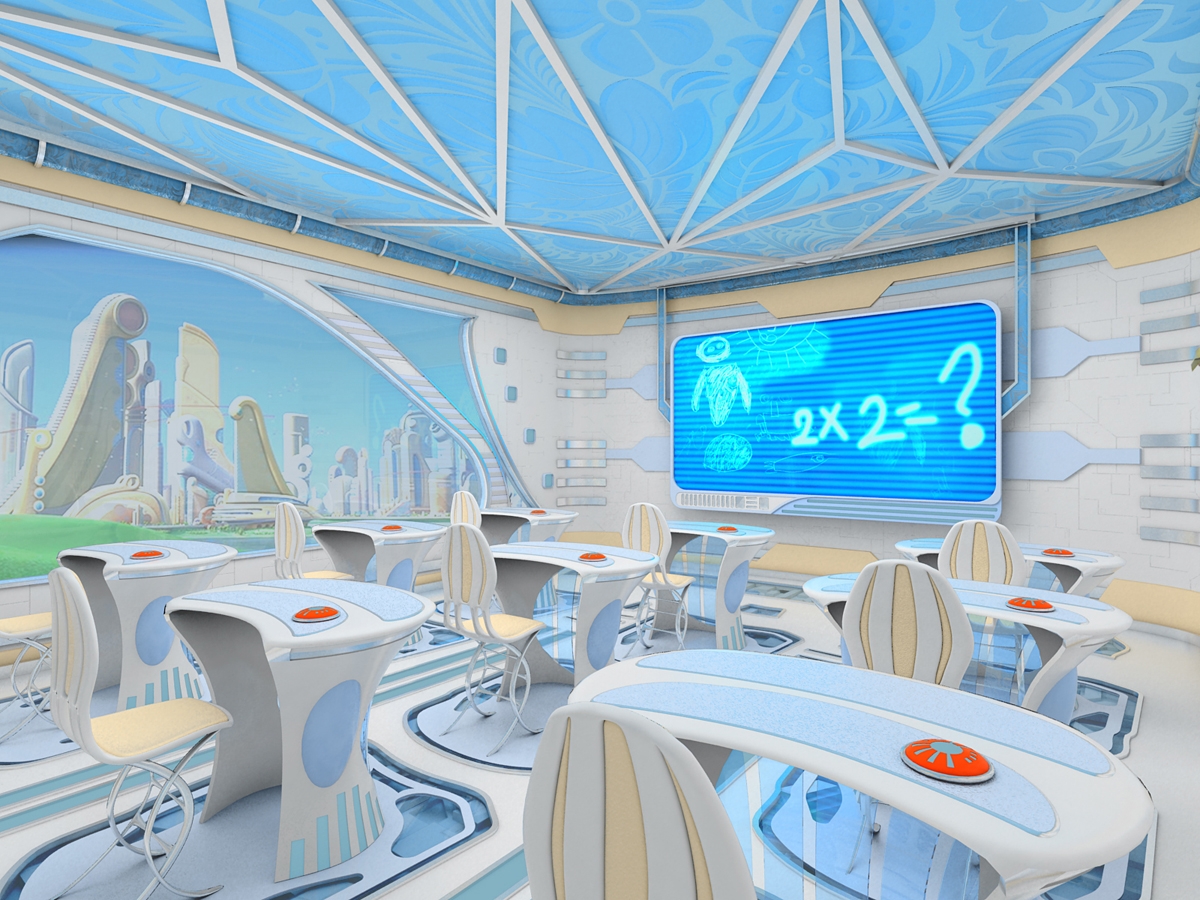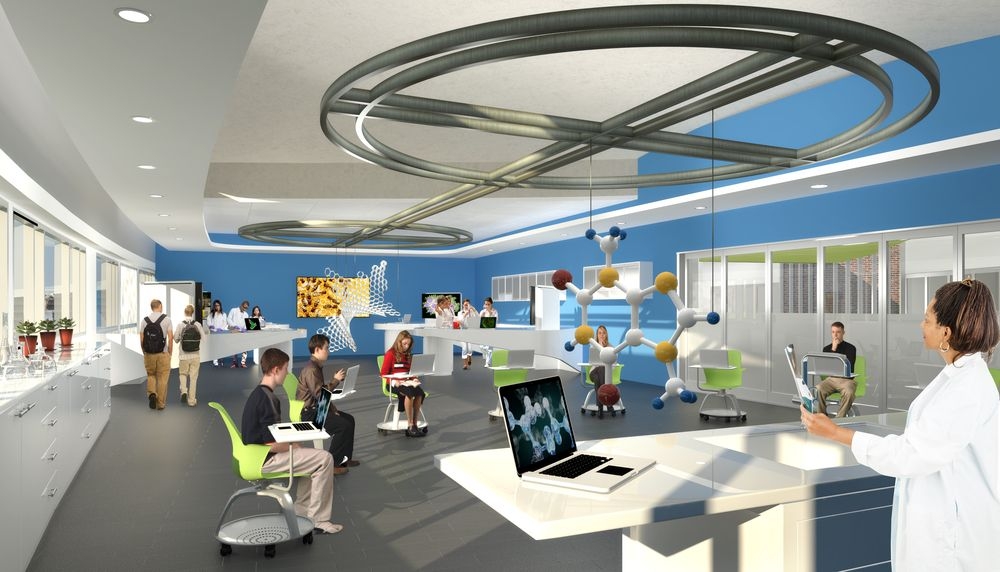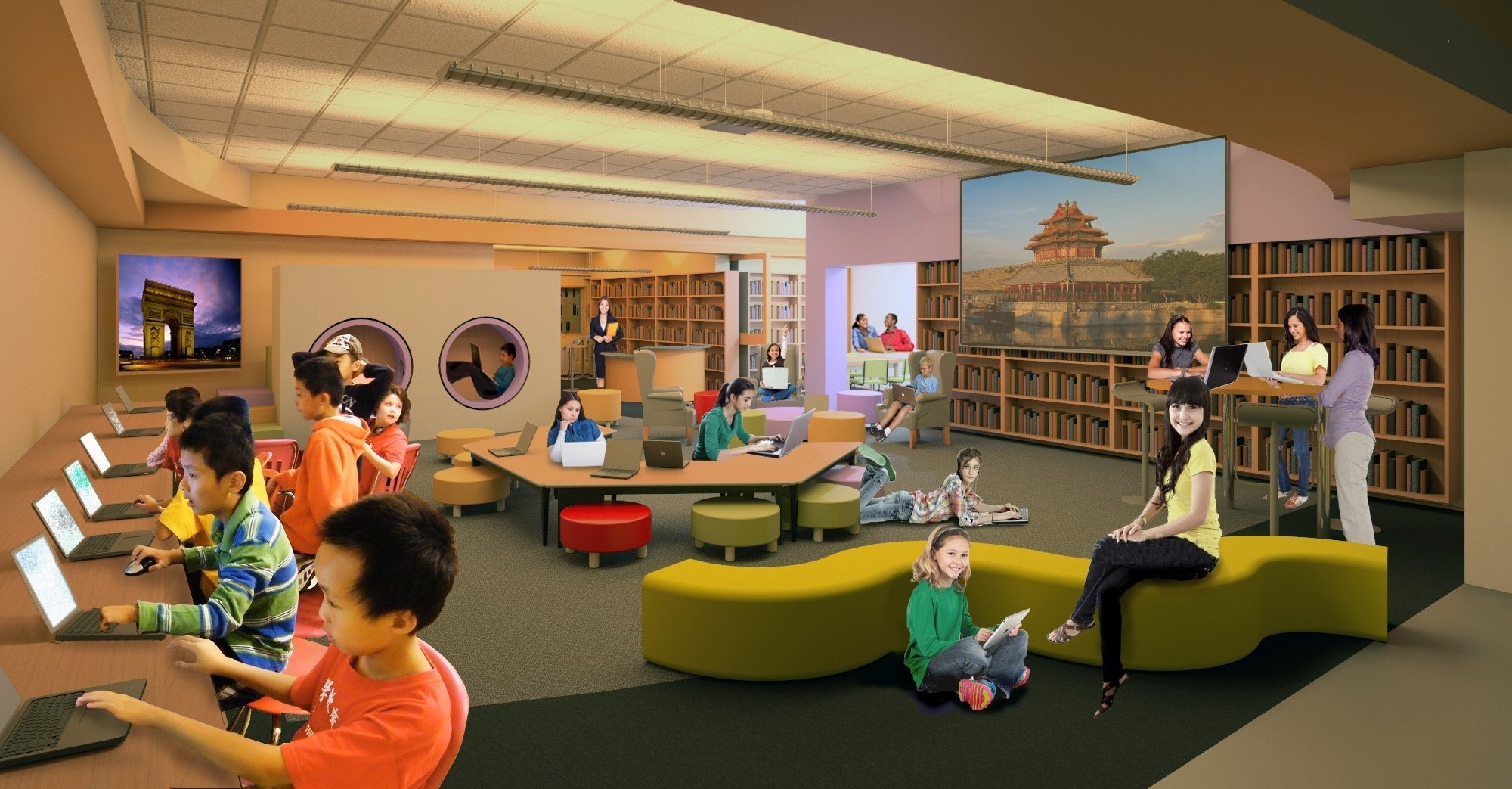The Future School
Have you ever imagined how your school would look like if it combined elements of cutting-edge education and technology? Have you ever wondered about how your children and grandchildren would learn in an era witnessing a digital revolution and astonishing transformations in every aspect of life?
In an era of rapid change where technology permeates our daily lives, we find ourselves confronted with new challenges in the field of education. Can a single school adapt to these changes and fulfil the evolving needs of future generations? In responding to this question, those leading educational development present a transformative vision for education known as the 'future school—a novel institution grounded in technological advancement and the cognitive evolution of society.
As a hub for creativity and innovation, the future school fosters ingenuity and endeavours to prepare future students by equipping them with skills and knowledge essential for navigating changes in society and the job market. With its inspiring and well-trained educators and cutting-edge technology, the school aims to serve as a beacon for equitable and diverse sustainable learning. Its goal is to offer personalised learning experiences tailored to the unique needs of each individual. This article provides comprehensive insights into what you need to know about the future school.
The Future School
The future school stands as an efficient and effective educational institution, playing a vital role in shaping the character of its students and equipping them for life. This school guides students on independently navigating information and utilising it through problem-solving methodologies that enhance their critical thinking skills, encompassing analysis, synthesis, categorisation, and evaluation.
Therefore, it is a school set apart from conventional institutions, featuring an integrated system with a defined mission, objectives, and plans. It operates with autonomous management overseeing its academic programs, prioritising the use of modern technology for information access. The school fosters a culture of self-directed learning among students, guiding them to face emerging scientific and cultural challenges stemming from contemporary economic and spatial globalisation. It also actively contributes to honing their skills, preparing them for real-life situations and adapting to their dynamic societal context.
The Future School Goals
The future school goes beyond conventional educational approaches; it embodies a holistic vision that acknowledges contemporary challenges and aligns with future aspirations. While the specific objectives of each future school may differ based on its unique vision and mission, here are some overarching goals commonly associated with future-oriented education:
- Anticipating the future and positively adapting to its developments.
- Strategically planning the optimal utilisation of human resources and financial assets to ensure goal attainment based on actual needs, without unnecessary fluctuations in the workforce, and avoiding any wastage of available material resources.
- Fostering a holistic learner, addressing intellectual, skill-based, emotional, and social dimensions of their personality.
- Empowering learners with problem-solving skills and adaptability by cultivating critical thinking, constructive skills, and values.
- Working to provide an educational environment that qualifies the learner to serve their community and advocate for their rights.
- Establishing close ties with the community, ensuring that the educational outcomes align with its needs and developmental requirements.

The Distinctive Features Of The Future School
The future school seamlessly blends hope with challenge. It is an educational institution with a vision harmonising with future aspirations, distinguished by a unique set of advanced characteristics. Some of its standout features include:
- The future school embraces a democratic and collaborative management approach, led by an educationally adept administrator equipped with a methodology that enables highly efficient educational leadership.
- At the heart of the educational process in the school of the future are the learners, active participants who proactively seek knowledge, evaluate their performance, and continually work on self-improvement. They are collaborative, fostering teamwork and demonstrating adept critical analysis skills.
- Teachers at the future school serve as exemplary role models for their students. They exude confidence in themselves and their abilities, believe in ongoing personal and professional development, meticulously plan educational scenarios, provide guidance and supervision, and encourage students' autonomy, respecting their opinions and supporting their initiatives.
- The curriculum at the future school is dynamic and activity-oriented, seamlessly adapting to the demands of the 21st century in terms of language, tools, and a scientific methodology rooted in analysis, justification, and integration. Students are not only educated in practical, hands-on skills spanning manual, industrial, and agricultural domains but also learn the importance of environmental preservation. The overarching goal is to graduate creative learners capable of navigating life's challenges, adapting to societal shifts, meeting community needs, aligning with workforce demands, and contributing to economic and social development agendas.
- The future school leverages cutting-edge educational technologies to implement dynamic teaching strategies, particularly emphasising the pivotal role of computers. This recognition stems from the understanding that learners acquire invaluable life skills through the adept use of technology.
- Understanding the profound impact of technology in education, the school future acknowledges its significance and elevates its integration to a strategic goal. This strategic goal involves actively engaging learners in higher-order thinking processes by encouraging exploration, research, and interpretation of observed phenomena. The ultimate aim is to propel learners towards a stage of creativity by stimulating their senses and intellect. Purposeful utilisation of modern technologies is instrumental in cultivating an educational system that yields comprehensive outcomes. This generation of students emerges with proficiency in deep learning, rigorous inquiry, productive investigation, critical analysis, effective problem-solving, and efficient task execution. Consequently, this contributes significantly to establishing a knowledge-based economy, meeting market demands, and ensuring adaptability to the ever-evolving requirements of our dynamic era.
- The future school is committed to attaining exceptional educational outcomes with a focus on elevated academic standards, especially in languages, mathematics, sciences, and computer studies. This commitment is realised through implementing modern teaching methodologies and innovative assessment strategies.
- The future school is dedicated to fostering an environment where gifted and talented students and those with special needs can thrive. Through specialised programs, it empowers exceptional learners to become innovators while simultaneously providing support to those with unique requirements, enhancing their academic achievements and bolstering their self-confidence. The school actively promotes a positive teacher-student relationship, emphasising collaboration and interaction with cutting-edge technology.
- Embracing a culture of modern technology, the school utilises e-books, audio-visual media, and the vast resources of the global information network. By incorporating hands-on experiments, students gain not only new and valuable information but also acquire practical skills. This approach nurtures a dynamic learning environment where students actively participate and take the lead in their educational journey.
- The school is committed to refining contemporary assessment strategies that embody precision, consistency, inclusivity, objectivity, and discernment among examinees. The outcomes of these assessments are meticulously archived in a comprehensive question bank, ensuring transparency and ease of access. Furthermore, the school embraces authentic assessment methodologies, evaluating students' achievements in real-world contexts and instilling in them a drive to participate in purposeful activities. Consequently, students cultivate heightened levels of performance and reflective thinking, adeptly analysing and critiquing data, solving intricate problems, and making judicious decisions. This approach nurtures a dedication to quality learning and stimulates an ongoing quest for excellence.
- The school structures are purposefully crafted to align seamlessly with the demands of its educational programs. Integrated facilities include a library, a theatre, sports arenas, and laboratories equipped with advanced safety features complemented by an aesthetically pleasing architectural design. Classrooms are interconnected via a global information network featuring projection units and expansive screens. Ample lighting and well-maintained temperatures characterise these spaces.
- The essence of education here centres around the individual, viewing the act of teaching as a paramount investment in the community's future.

It transcends conventional teaching approaches, opting for an education that fosters students' critical thinking ability. The school is dedicated to arming students with valuable values and practical skills, seamlessly blending cognitive and ethical objectives. Consequently, within the future school, the minds of educators and learners converge, aspiring to forge a generation adept at proficiently applying their knowledge and skills. Their collective objectives encompass securing a resilient future, addressing community needs, devising effective solutions to challenges, and championing their rights and achievements.
The Future School Models
Here are some specific models of future schools, consisting of five models:
1. The Learning-Centric School
This school revolves around the principle of sustainable education, emphasising that learning is a continuous process throughout life, catering to individuals across all human categories and levels. It creates an environment where education is seamlessly integrated into lifelong development for everyone.
2. E-School
In this school, computer systems and modern technologies are utilised in all administrative processes.
3. The Quality-Oriented School
This school adopts the principle of comprehensive quality, focusing on the concept of continuous improvement, whether in academic achievements or teaching methodologies.
4. The Collaborative School
Embracing the principle of cooperative education, this school fosters collaboration between teachers and students, as well as among teachers themselves, working together to enhance and develop teaching methods.
5. The Creative School
This school adheres to the principle of encouraging and nurturing creativity, provided that the appropriate infrastructure is in place to activate individuals' creative potential.
Educational Technologies In The Future School
In the evolving landscape of education, several innovative learning and teaching technologies are poised to redefine the future school.
1. Email Communication
Email serves as a swift communication channel, fostering quick exchanges between learners, parents, and the local community.
2. Digital Libraries
Consolidates electronic storage of paper-based materials on magnetic or optical media, non-paper materials in files (authors or publishers), or databases accessible via programmed discs or direct connection.
3. Online Courses
The teacher meticulously crafts their lessons and topics using a designated computer or interactive video tools. The lesson is seamlessly uploaded at the appointed time, leveraging the school's database. This grants students the flexibility to electronically engage with the lesson at their convenience—be it during breaks, after school hours, or from the comfort of their homes.
4. Chat Applications
These platforms function as a communication channel connecting teachers and students online, enabling prompt responses to inquiries and questions. This interactive medium allows experts from diverse locations to engage in discussions on specific topics using both audio and visual elements.

5. E-Books
It refers to any book or publication generally in a digital electronic format, distributed electronically, and read on computing devices or various digital personal assistants.
6. Smart Classrooms
Smart classrooms, equipped with high-specification computers, enrich the learning environment. They facilitate effective communication between teachers and learners on one hand, and between teachers on the other hand.
7. Virtual Learning
It relies on the use of modern technologies such as computers and the internet, providing students with information sources in case the teacher is not physically present or is teaching remotely.
In Conclusion
After understanding the prospects offered by the future school for education and learners, it is essential to enhance our current schools to align with the requirements of the modern era and continuous technological advancements. The future school is a dream that captivates many enthusiasts eager to improve the education system.
Despite the challenges facing this idea, it represents a real opportunity to bring about a radical change in education and shape a generation that is educated, aware, and ready to confront the challenges of the future. Therefore, it is incumbent upon society to unify efforts to realise this dream and invest in the future of our children and ourselves.